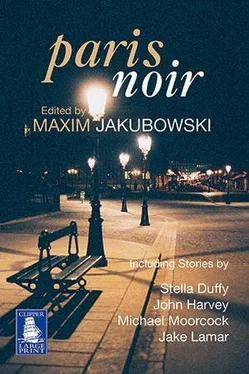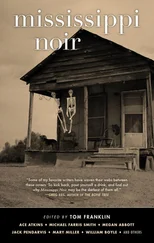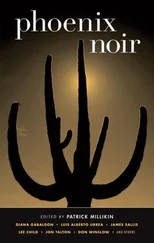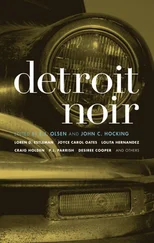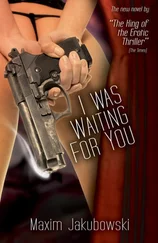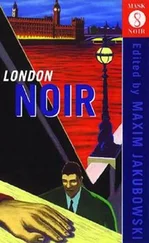Maxim Jakubowski - Paris Noir
Здесь есть возможность читать онлайн «Maxim Jakubowski - Paris Noir» весь текст электронной книги совершенно бесплатно (целиком полную версию без сокращений). В некоторых случаях можно слушать аудио, скачать через торрент в формате fb2 и присутствует краткое содержание. Жанр: Детектив, на английском языке. Описание произведения, (предисловие) а так же отзывы посетителей доступны на портале библиотеки ЛибКат.
- Название:Paris Noir
- Автор:
- Жанр:
- Год:неизвестен
- ISBN:нет данных
- Рейтинг книги:3 / 5. Голосов: 1
-
Избранное:Добавить в избранное
- Отзывы:
-
Ваша оценка:
- 60
- 1
- 2
- 3
- 4
- 5
Paris Noir: краткое содержание, описание и аннотация
Предлагаем к чтению аннотацию, описание, краткое содержание или предисловие (зависит от того, что написал сам автор книги «Paris Noir»). Если вы не нашли необходимую информацию о книге — напишите в комментариях, мы постараемся отыскать её.
Edited by Maxim Jakubowski, the stories range from quietly menacing to spectacularly violent, and include contributions from some of the most famous crime writers from both sides of the Atlantic, as well as the other side of the Channel.
Paris Noir — читать онлайн бесплатно полную книгу (весь текст) целиком
Ниже представлен текст книги, разбитый по страницам. Система сохранения места последней прочитанной страницы, позволяет с удобством читать онлайн бесплатно книгу «Paris Noir», без необходимости каждый раз заново искать на чём Вы остановились. Поставьте закладку, и сможете в любой момент перейти на страницу, на которой закончили чтение.
Интервал:
Закладка:
But who will hear?
Translation © Lulu Norman and Ros Schwartz
THE FLÂNEUR OF LES ARCADES DE L’OPÉRA by MICHAEL MOORCOCK
THE FIRST CHAPTER: IN THE LUXEMBOURG GARDENS
In all the many cases investigated by Sir Seaton Begg of the Home Office Metatemporal Investigative Agency, one of the most curious concerned his co-operation with his opposite number, Commissaire Lapointe of the Sureté du Temps Perdu, involving not only the albino gentleman connected to a royal house whom we call ‘Monsieur Zenith’, but also members of an infamous terrorist gang, a long-dead enemy of Begg’s German cousins and the well-known adventuress, Mrs Una Persson. As Begg’s friend, the pathologist Dr ‘Taffy’ Sinclair, remarked, ‘For a while it seemed that Chaos, in all its unchained wildness, had been let loose through every region of our vast and complex multiverse, so that even now we cannot be certain whether it was contained or whether we are merely experiencing a moment of relative harmony in a howling cacophony…’
‘I cannot tell you, my old friend, how delighted I am that you should come over at such short notice.’
Lapointe, his assistant Bardot, Taffy and Begg were wandering through the pale gold autumn light of the Luxembourg Gardens. The chestnut trees were shedding dark reds and yellows and the flower beds were full of beauty on the verge of succumbing to winter. Lapointe had thought it expedient for them to talk in the open air where there was less chance of being overheard.
‘The train? Was it comfortable?’
In his light tweed sports jacket, white shirt and well-pressed flannels, Lapointe had a bulky, stiff-necked, slightly professorial air, with a great wave of grey hair untidily arranged over his pale forehead. His deep green eyes, angular features and heavy body gave him the air of a large amiable dinosaur. Begg knew his opposite number had one of the sharpest minds on the Continent. Single-handedly Lapointe had captured the ex-police inspector turned crook: George Marsden Plummer (alias ‘Maigret’ in France) who had once been Lapointe’s chief. Lapointe had also been the one to bring ‘Fantomas’ to book at last. Together he and Begg had tracked down ‘Jock Collyn’, otherwise known as The Master Mummer, and been instrumental in his lingering to this day on Devil’s Island. Inspector Bardot, on the other hand, had no spectacular record, but was much admired at the Quai des Orfèvres for his methodology and his coolness under pressure. Small, dark, he seemed permanently and privately amused. He wore a buttoned three-piece grey suit and what was evidently an English school tie.
The two Home Office men had come from London via the recently opened Subchannel Excavation, whose roads and railway lines now connected the two nations, a material addition to the decades-old Entente Cordiale, an alliance which had been cemented by the signing of a European-wide Mutual Co-operation Pact, which, with the Universal Civil Rights Act, united all the Great Powers, including the Confederated Forty-Seven States of America, in one mighty alliance, sharing common laws and goals.
‘Perfectly, thank you,’ said Begg, speaking excellent French. Lapointe had put the STP’s private express at his disposal. The journey had taken less than an hour and a half from London to Paris. ‘I must say, Lapointe, that you French chaps have your priorities well in hand – rapid and comfortable transport and excellent food among them. We had a superb lunch en route.’
The French detective acknowledged this compliment with a small self-deprecating shrug.
Taffy, taller than the others, murmured his own discreet appreciation.
‘I gather, Dr Sinclair, that you are recently back from the Republic of Texas?’ Lapointe courteously acknowledged the pathologist, whose expertise was internationally famous.
‘Indeed.’ Sinclair removed his wide panama and wiped his glistening head with a large Voysey-patterned Liberty’s handkerchief, which seemed an uncharacteristic part of his otherwise muted wardrobe. Save for his taste in haberdashery, nobody would have guessed that during his time at Oxford he had been a leading light in the post-Pre-Raphaelite revival and that women had swooned over his massive head of hair and melancholy features almost as much as over his poetry. Like his friend and colleague, he wore a cream-coloured linen suit, but whereas Begg’s tie was a rather flamboyant bow, Sinclair’s neck was adorned by his old school colours. Indeed, his tie was identical to Bardot’s. The two had been contemporaries at Blackfriars School and later had attended the Sorbonne before Bardot, eldest son of a somewhat infamous Aquilonian house, entered the service of the Quai d’Orsay and Sinclair, after a spell in the army, decided to follow his father into medicine and the civil service.
‘You are familiar with the shopping arcades which radiate off the Place de L’Opéra?’ murmured Lapointe once they were strolling down a broad avenue of chestnut trees towards the Gardens’ rue Guynemer entrance. ‘And you are aware, I am sure, of the reputation the area has at night, where assignations of the heart are pursued and men and women of a certain inclination are said to come together.’
‘I have read something of the place,’ said Begg, while Taffy nodded gravely.
‘These arcades are the most complex in Paris, of course, and extend into and beneath the surrounding buildings, in turn becoming a warren of corridors and suites of chambers connected to the catacombs. They have never been fully mapped. It is said that some poor devils have been lost there for eternity, cursed to wander forever beneath the city.’
Begg smiled. ‘I am familiar with Smith’s Kitchen in London, which is similarly configured. I know the stories of the Arcades, yes. How fanciful they are, I have yet to judge. I know, too, that they were spared destruction by Haussmann, when he was building the boulevards of Paris for Louis Napoleon, because the Emperor himself wished to preserve his own somewhat lavish pied-à-terre where he maintained the notorious Comtesse de Gavray.’
‘Exactly, my friend. Whose favours he was said to share with Balzac the Younger. I gather there was some scandal. Didn’t Balzac denounce her as a German spy?’
‘In 1876. Yes. It was the end of her career. She fled to Berlin and ended her days in penury. Strangely, this present case has echoes of that one.’
As he reached the little glass and wrought-iron café across from the Théâtre des Marionettes, Lapointe paused. ‘The coffee here isn’t too bad and I see there is a table just over there where we are unlikely to be disturbed.’
With the acquiescence of the others, Lapointe let them seat themselves at the dark-green metal table and signalled for a serviteur , who came immediately, recognising a regular customer. A brief exchange followed. Typically, the Englishmen ordered café crème and the Frenchmen took theirs espresso. They sat in silence for a little while, admiring the merry-go-round, with its vividly painted horses rising and falling in comforting regularity, circling to the tune of a complex steam-driven fairground calliope, as excited little boys and girls waved to waiting parents. The puppet theatre was yet to open and many of the children, Begg knew, would disappear into its darkness soon enough to witness the traditional bloody escapades of Guignol which had entertained French children for the past century or more.
It delighted Begg to see that the same diversions which he had enjoyed as a boy were equally pleasing to this, the first generation of the new century. He was always grateful that his father’s diplomatic work had allowed him to make a home in the French capital. For him London and Paris made a natural marriage, if not exactly of opposites, then of complementary personalities. Both had powerful public images and a thousand secrets, not all of them by any means sinister.
Читать дальшеИнтервал:
Закладка:
Похожие книги на «Paris Noir»
Представляем Вашему вниманию похожие книги на «Paris Noir» списком для выбора. Мы отобрали схожую по названию и смыслу литературу в надежде предоставить читателям больше вариантов отыскать новые, интересные, ещё непрочитанные произведения.
Обсуждение, отзывы о книге «Paris Noir» и просто собственные мнения читателей. Оставьте ваши комментарии, напишите, что Вы думаете о произведении, его смысле или главных героях. Укажите что конкретно понравилось, а что нет, и почему Вы так считаете.
